“Restoring China-US Ties”: Reframing US-China Bipolar Dynamics by Pluralizing into China-West Relations
Roundtable from the 8th China Global Think Tank Innovation Forum
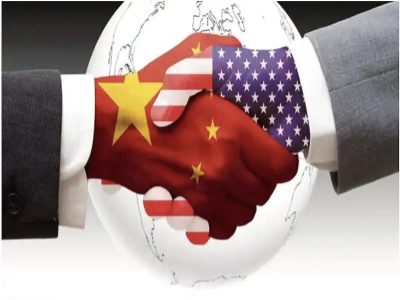
All Global Research articles can be read in 51 languages by activating the Translate Website button below the author’s name.
To receive Global Research’s Daily Newsletter (selected articles), click here.
Click the share button above to email/forward this article to your friends and colleagues. Follow us on Instagram and Twitter and subscribe to our Telegram Channel. Feel free to repost and share widely Global Research articles.
***
Heiwai Tang, Emanuel Yi Pastreich, HE Weiwen, George S. Geh, JIANG Shan, XU Zhengzhong, LÜ Xiang, LI Chen regret rising deglobalization and call for communication to restore China-U.S. ties.
*
This transcript is Part II of “Reframing US-China Bipolar Dynamics by Pluralizing into China-West Relations” roundtable from the 8th China Global Think Tank Innovation Forum, covering eight more speakers:
- Heiwai Tang, Associate Director Institute of China Economy and the Hong Kong Institute of Economics and Business Strategy at the University of Hong Kong (HKU)
- Emanuel Yi Pastreich, President, The Asia Institute
- HE Weiwen, CCG Non-resident Senior Fellow; former Commercial Counsellor at Chinese Embassy in New York and San Francisco
- George S. Geh, Chief Executive Officer, China Institute in America
- JIANG Shan, CCG Non-resident Senior Fellow; former Director-General of MOFCOM Department of American and Oceanian Affairs
- XU Zhengzhong, CCG Non-resident Senior Fellow; Vice President of the International Institute for Strategic Studies
- LÜ Xiang, CCG Non-resident Senior Fellow; Research Fellow of Institute of American Studies, Chinese Academy of Social Sciences
- LI Chen, Associate Professor, School of International Studies, Renmin University of China
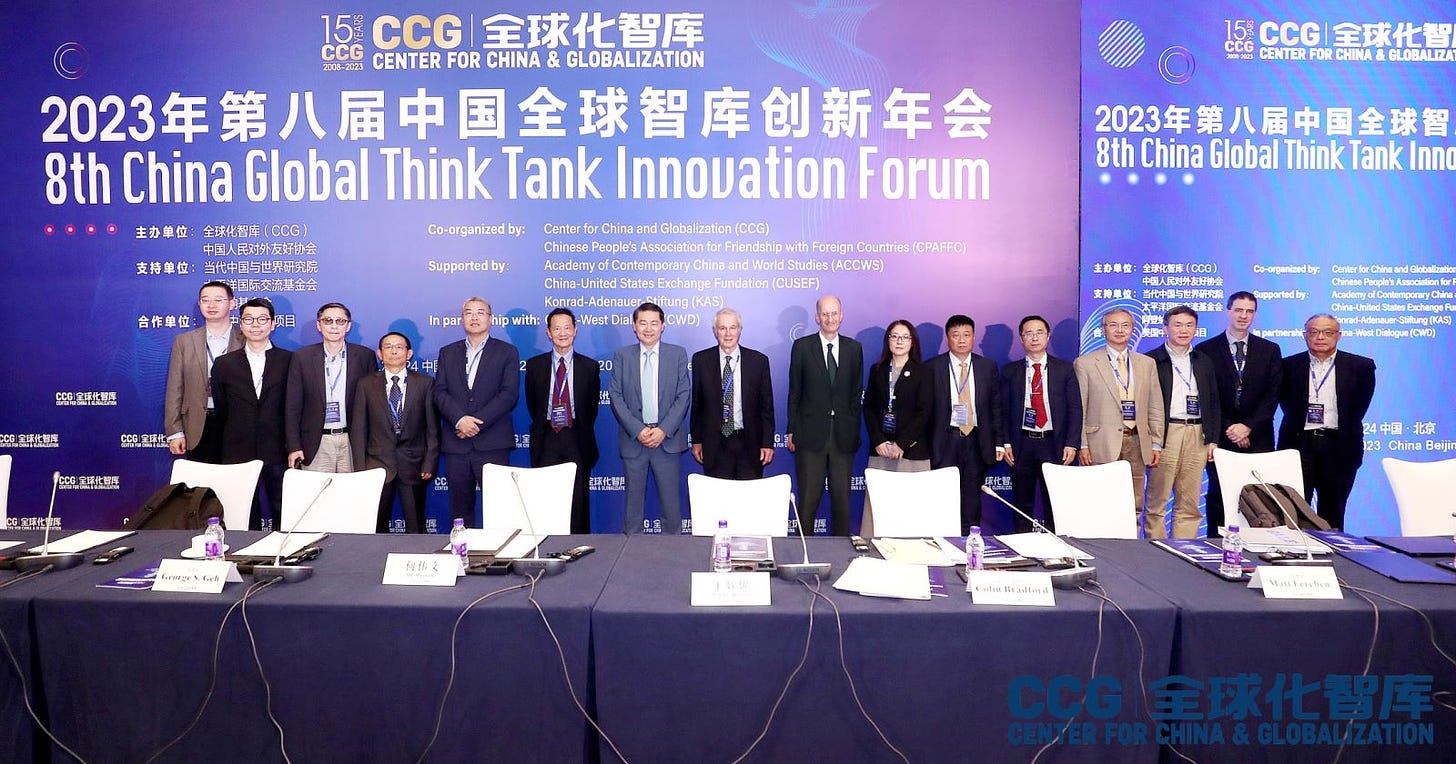
The Oct. 23 forum was organized by the Center for China and Globalization (CCG) and Chinese People’s Association for Friendship with Foreign Countries (CPAFFC), supported by the Academy of Contemporary China and World Studies (ACCWS), China-United States Exchange Foundation (CUSEF), and Konrad-Adenauer-Stiftung (KAS), in partnership with China-West Dialogue (CWD).
The full video is available on YouTube. It was also broadcast online by CCG and remains available in China both in English and Chinese.
Please note that this transcript is transcribed by CCG from the audio and video recordings and may contain errors. It hasn’t been reviewed by the speakers.
Speakers’ Presentations
Emphasis added by Global Research
Heiwai Tang, Associate Director Institute of China Economy and the Hong Kong Institute of Economics and Business Strategy at the University of Hong Kong (HKU)
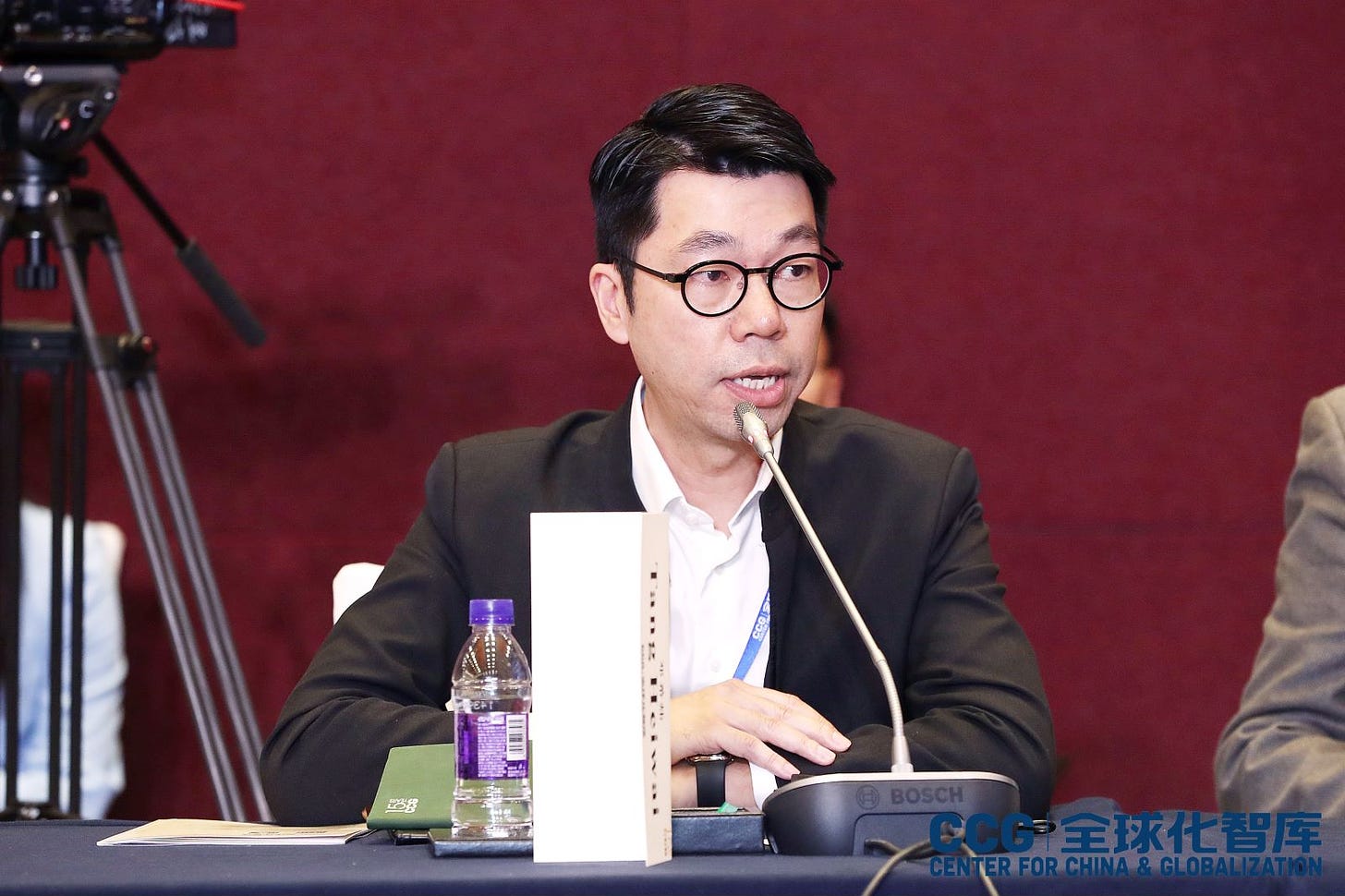
In the interest of time, I’m just going to make three points. I actually had a prepared speech, but I’m going to skip it because I was so inspired since this morning, and also heard a lot in this session. First of all, thank you, Henry Wang, for creating this opportunity for me to speak. This is a wonderful event. This is exactly what we need to have a lot more of in both China and the United States.
The first point I want to make is related to this morning’s session when people talked about respect and dialogue. And I think the ultimate goal is to have more mutual understanding between the two countries, as well as trying to build trust between them.
And I have to say, you know, I come from Hong Kong, and I taught in the United States for over 15 years. One thing that I realized in the US is that academics, I’m talking about academics, increasingly had difficulty coming to this part of the world just to engage in some regular, normal academic activities.
I tried my best to invite some of my friends in the US teaching in public universities to come to Hong Kong to give academic talks. And they told me they don’t want to do it, not because they find Hong Kong to be very dangerous.
It’s because they had to go through multiple levels of approvals in the universities and requirements from the IT department in the university for them to bring an empty laptop to Hong Kong.
OK. So, I think this is not encouraging for people to exchange ideas and to learn about each other, and I’m really seeing a downward spiral due to these kinds of restrictive policies. My former colleague, Hal Brands, at Johns Hopkins SAIS, wrote a piece in 2017 published in Bloomberg magazine, pointing out a very obvious point, saying that during the Cold War era, there were a lot of students studying Russian, the language, and also the country, the Soviet Union.
But now, in 2023, he started seeing basically older universities shutting down departments on China, on Chinese history, on China studies. And this is not helpful for the Americans to know something more about China. And I’m pretty sure the same thing is happening in mainland China too. And again, living in Hong Kong, I have the luxury to basically go to the US without much restriction. So that’s my first point.
My second point is related to the title of this session, which is pluralism. I think I would like to add a word that is related, and that is decentralization. When we look at global macro phenomena, de-dollarization, decoupling, deglobalization, whatever words that start with the letter “d”, we tend to connect them to geopolitics right away.
But in fact, technologies are also creating these kinds of trends, allowing countries to outsource from multiple places, allowing companies not to produce everything in one single location. So, I think we need to think harder about why we are living in such a world that is increasingly more fragmented, more fractured. Partly because of geopolitics, but also partly because of new technologies like AI, blockchains, whatever.
The third point I want to make is that, due to the tension between the United States and China, there are up and rising star countries in Southeast Asia, in the Middle East, in Latin America. So those new emerging markets are exactly what we are going to see in the next five to ten years. We are indeed moving towards a multipolar world.
And I understand, sort of the underlying meaning of Professor Nye’s statement this morning. I think we are too obsessed with looking at the two biggest powers in the world and focus too much on the tension and ignore the global South, the rest of the world, and those are our strategic partners. No country wants to take sides. If you go to Southeast Asia,
I would bet, besides the Philippines, most of the countries would say, I don’t want to take sides, don’t force me to do so.
And, importantly, I’m happy to see new regional economic and trade agreements, like RCEP, or the new Bricks that has six new members. And I think many countries are giving up relying on some improving relationship between the two powers. And they’re starting to do something important for their economies. And they don’t want to be trapped in these many years of geopolitical tension between the two powers. So, these are my three points. I could make more, but I should let Emanuel and others speak. Thank you.
Emanuel Yi Pastreich, President, The Asia Institute
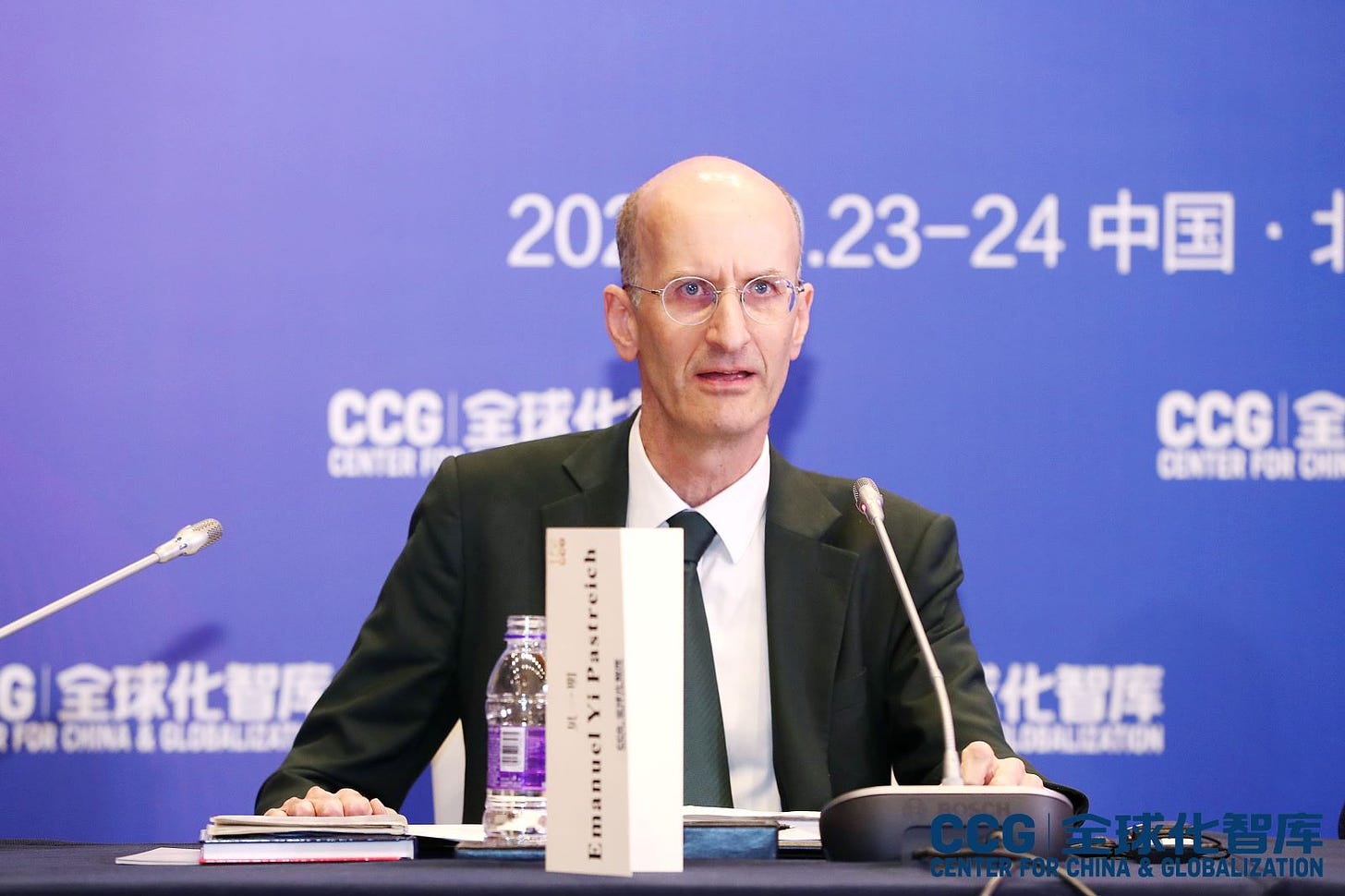
I want to say that Chinese is a common international language, when Chinese people start speaking in English, it makes it difficult for those who don’t know English to participate in our discussions. Therefore, I am basically against it. Opinions should be expressed in one’s native language. But I think that it will cause some problems because this is an international setting, so I’ll be speaking in English instead, though I can speak Chinese.
Confucius mentioned the idea of the rectification of names, let’s say, 正名一词, the names and things should be in harmony together. And this is the primary cause of problems and breakdown in governance. And I think if we look at both the American and the Chinese side, that break is really at the core. And since we don’t talk so much about it in many of these discussions, I’ll go out on a limb and say a couple of words.
First, I’m going to talk about the United States, but everything I say applies to China, although with Chinese characteristics. First is the government. Obviously, the government is critical, but we see a radical tendency to privatize the government, whether it’s in the legislature, in which government-elected officials and staff members go work for hedge funds for several years to enrich themselves, or the outsourcing of processes to for-profit organizations with their own conflicts of interest.
This spills over into the military, which is also increasingly and intelligently outsourced, often to multinational corporations whose interests do not correspond with the nation-state necessarily. And with the word “bank,” I’d like to say that the term “bank” we used, but in fact, in many cases, it no longer corresponds with “bank” in the sense that we knew it 40 years ago, or even 15 years ago. The nature of banks and the nature of banking, the nature of money, has profoundly shifted, and the term, the concept, has not kept up with these transformations.
Journalism, the passing on of accurate information to the people about what’s happening in the world, has also been transformed by the nature of journalism and its commercialization, and this has had a terrible effect, both in the United States and China and globally. And finally, I think the most serious, although it’s probably not discussed that much, is the terms “science” and “technology.” I’ve had a lot of problems, especially in China, but also the United States.
People use the term “science” and “technology” together as if they’re the same thing. In fact, science is the complete opposite of technology. Science is the philosophical pursuit of truth, using a variety of methods, and the scientific method being the most prominent, to ascertain what is accurate or true. Technology is a process or a system which produces a result, and often they’re in conflict. As we know, in this digitalized world, in which we have systems of technology which often produce untrue results. Thank you.
HE Weiwen, CCG Non-resident Senior Fellow; former Commercial Counsellor at Chinese Embassy in New York and San Francisco
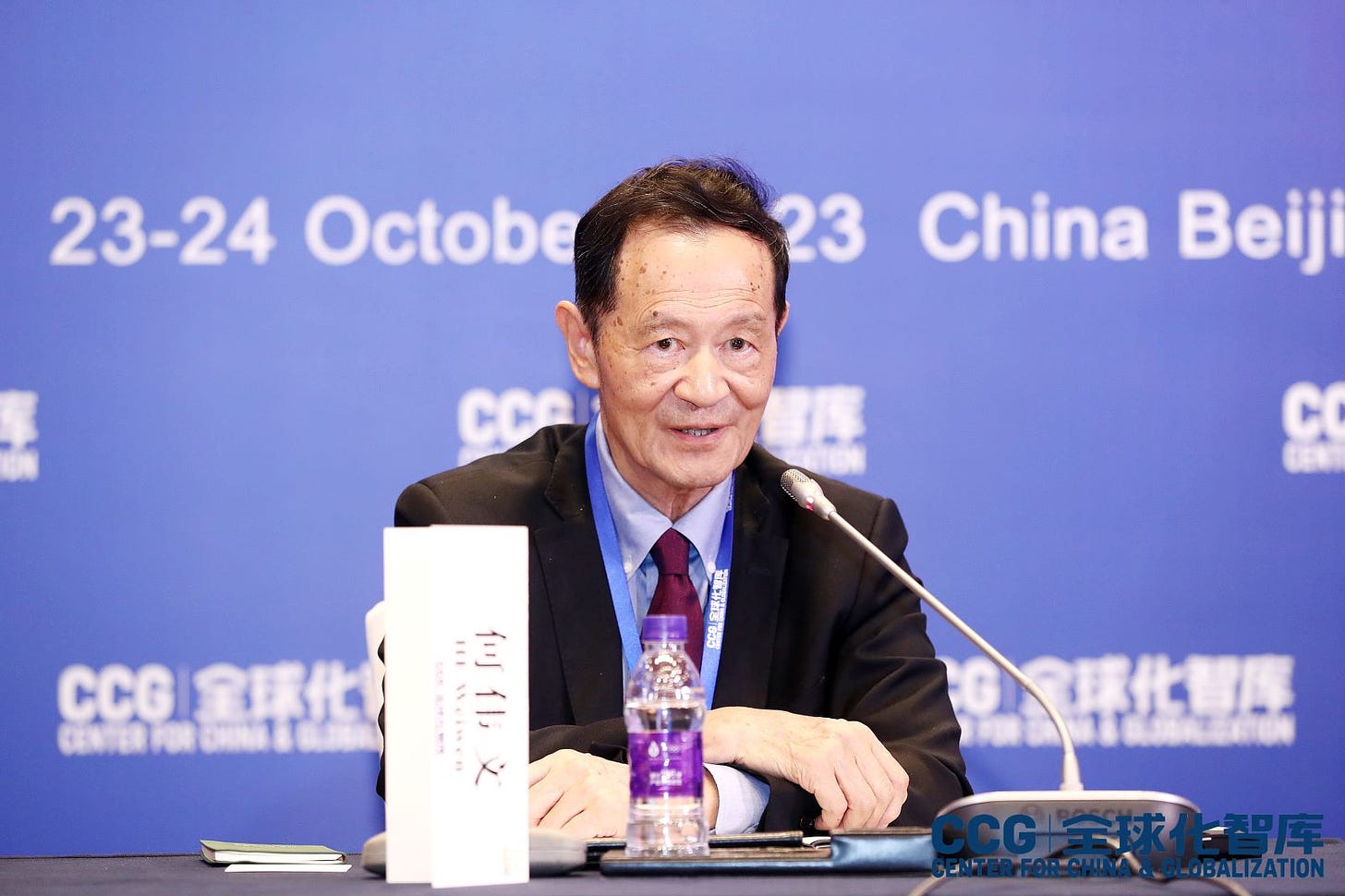
I would like to make three points. First, on managing China-US relations. I’m not sure whether we can use the term “China-US bipolar dynamics,” because we are not in a bipolar world. Nonetheless, maintaining a stable China-US relationship is of vital importance for world stability and prosperity. Over the past few months, we have witnessed an interesting phenomenon.
On one side, the differences between the two countries are intensifying. On the other side, the tensions between the two countries are mounting. This might become the new normal in the coming months and even years ahead because both countries are seeking ways to stabilize the relationship based on the UN charter and principles, namely, mutual respect for sovereignty and territorial integrity, non-aggression, non-interference in internal affairs, equality and mutual benefits, and peaceful coexistence. Regardless of our significant differences, we can maintain a stable state-to-state relationship. This will also enlighten our relations with other Western countries. That’s one point.
The second point is to enhance China-Western relations. The China-US relationship, no matter how important, is only a part of China-West relations. We need to adopt a broader perspective.
Did you know that 50% of China’s trade is with Asia? Another 20% is with Europe. Only 16% of China’s trade is with North America. Over the past ten years or more, plurilateral mechanisms have played an increasingly important role in stabilizing the global situation and addressing the world’s pressing issues. We should continue this approach. While we aim to strengthen China-West relations, our focus should be on specific hot topics.
The third point is to support re-globalization. This might be a relevant topic for China-West Dialogue. Currently, the world is grappling with geopolitical segmentation and geoeconomics fragmentation.
This geoeconomics fragmentation now has a term: Homeland Economics. It’s becoming prevalent in many countries. However, according to an IMF study, if geoeconomics fragmentation continues, it will curtail global GDP growth by a minimum of half a percent, and up to 12% at most. This would be detrimental for everyone, including China, the West, and the developing world. As we navigate the 4th Industrial Revolution, marked by breakthroughs in big data, artificial intelligence, quantum computing, new energies, and new materials, the rapidly evolving technologies might outpace the capabilities of all our countries, potentially overshadowing our differences.
We should collectively focus on strategies for managing the global supply chain, pinpointing, and addressing differences, and ensuring security in these changing times. How can we optimize a global supply chain for the maximum benefit of all countries and minimize risks? To achieve this, we should collaborate with industrial associations and transnational corporations, drawing from their latest experiences, knowledge, and insights. If we can contribute in this manner, it will be beneficial for both China and the West, as well as the broader global community. Thank you.
George S. Geh, Chief Executive Officer, China Institute in America
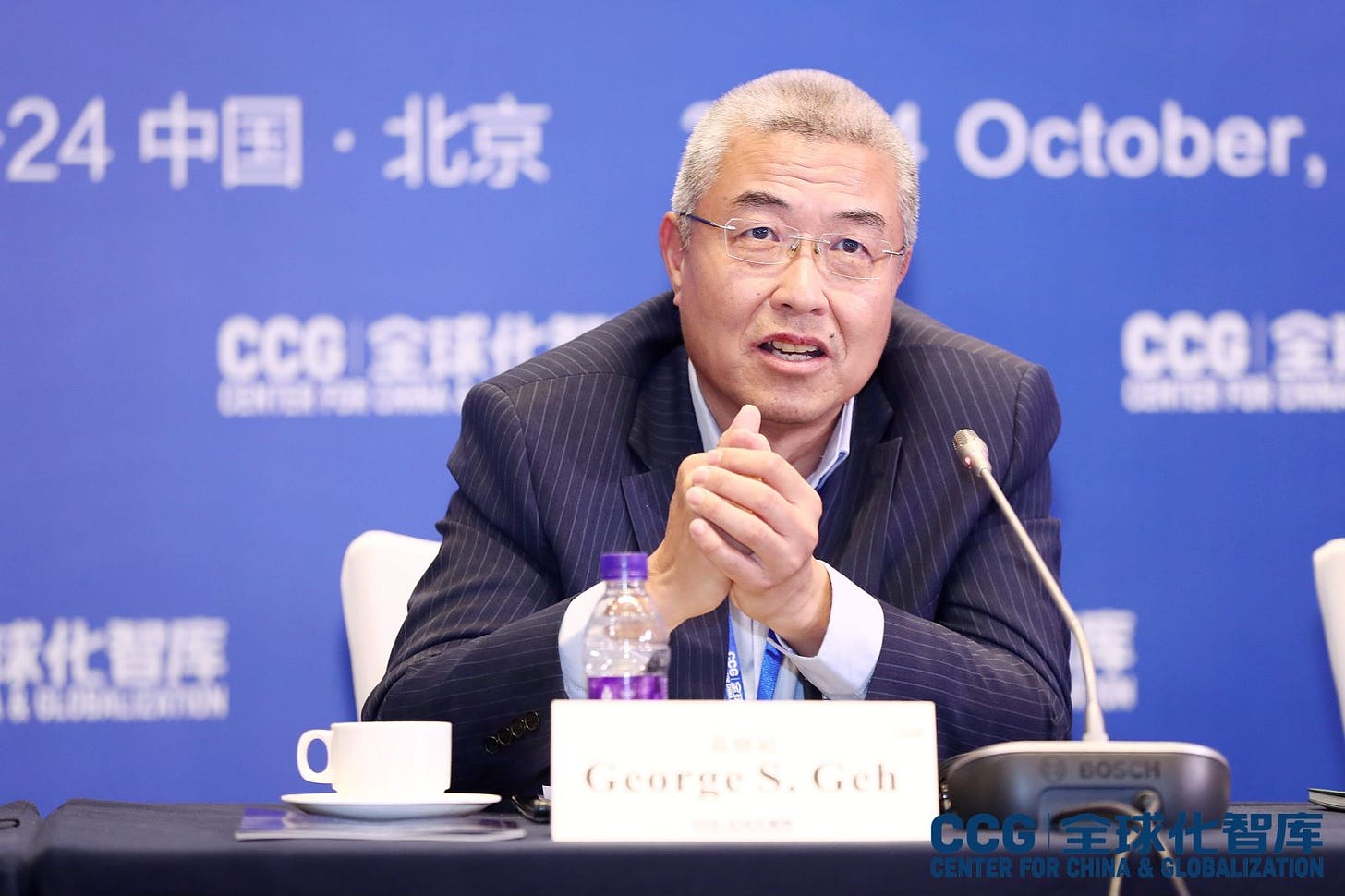
Thank you. Maybe I could bring a little bit different perspective than most speakers here today. We all know, politicians come and go. We all know policies change over time.
But the cultural aspect, educational aspect of human society, will always stay, right? Which is why 97 years ago, American educators John Dewey and Paul Monroe, and Chinese educators, Mr. Hu Shi and Guo Bingwen, founded what is called China Institute in America in New York City. Now, 97 years later, we are still going on with one mission from day one, which is to build a bridge between the American people and Chinese people through programs in arts and culture, in education, in business. Which is why I’m the CEO of the Institute, and I have my co-chair Peter Walker over there. We are here to participate in this discussion, and we want to make sure the exchanges between the peoples will continue to be strong, especially in today’s geopolitical environment. Thank you.
JIANG Shan, CCG Non-resident Senior Fellow; former Director-General of MOFCOM Department of American and Oceanian Affairs
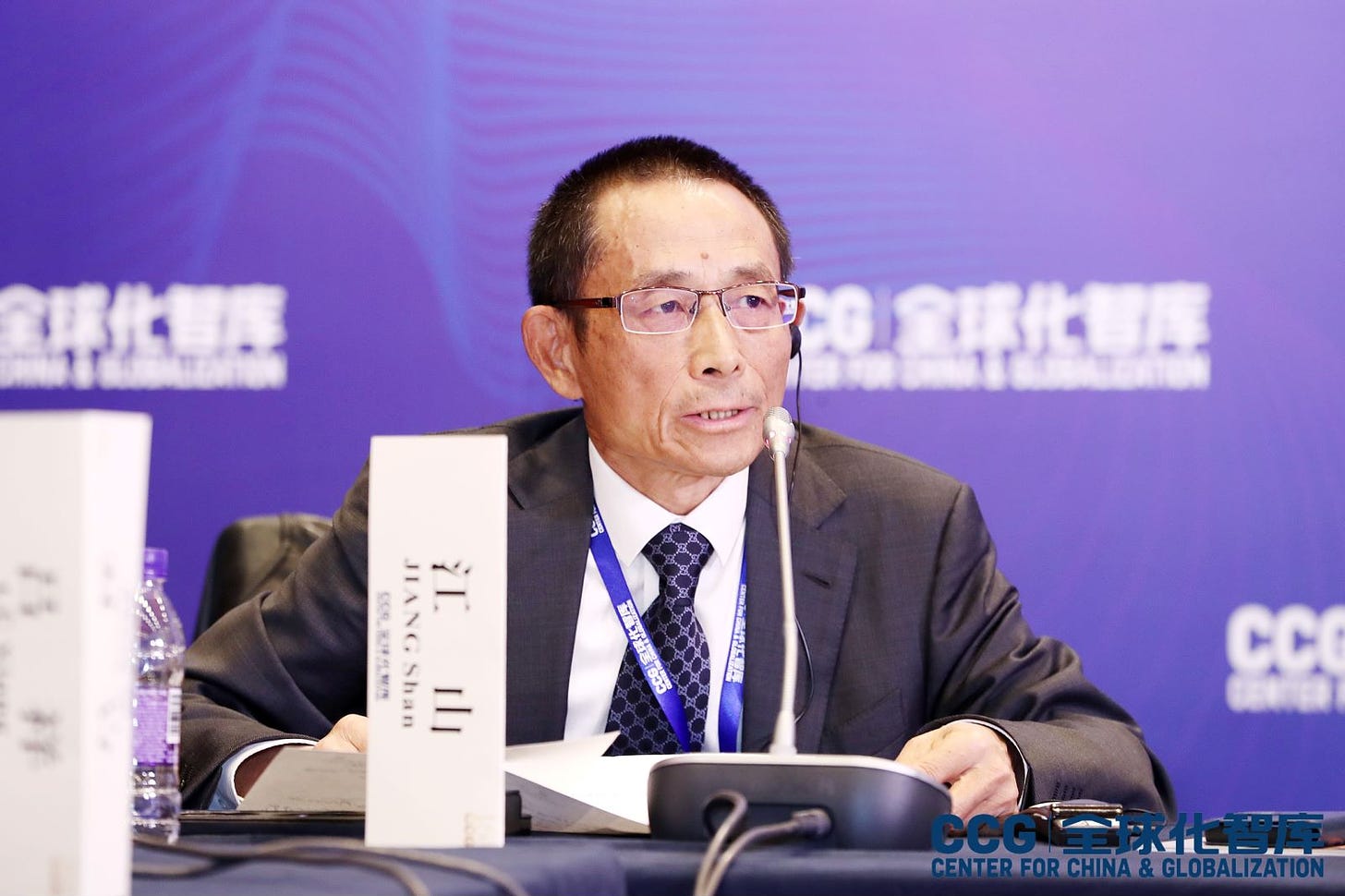
Thank you very much, Mr. Chair. So, from the very beginning of the morning, I have been listening to what our top experts have in their mind about international affairs and China-US relations. I have been deeply inspired. I engaged in some economic activities between China and the United States for some time. So, I want to share with you from that perspective.
We have experienced economic globalization and China’s reform and opening up. I can see that most of you are in your fifties or sixties. So, I think the decades that we have experienced have brought great opportunities to China and to the whole world. And now we are facing unprecedented changes and a lot of dynamics in the international situation. We have seen COVID-19 and the increasing tensions between China and the United States.
So, it is very necessary for us to talk about China-U.S. relations, especially the business ties. When we talk about business ties in the past, we often say that business ties are the ballast stone and stabilizer of our relations. Without the business ties, yes, indeed, it is impossible for us to be here today. I still believe that business ties are crucial.
As some scholars have put it, during the Cold War era, the former Soviet Union and the United States had no economic ties or engagements. But in the past four decades, we have become part of each other, and we are inseparable from each other.
Our trade rose from 2.5 billion at the establishment of diplomatic ties to 750 billion (according to China), or 690 billion, according to the United States—an increase of several hundreds of folds. So, in the past few decades, our business relations have also gone through ups and downs, and we have experienced a lot of arguments or fierce negotiations. And finally, we can find our consensus for common progress.
So, between China and the United States, we have established more than ten mechanisms for dialogue. Economically, we have the strategic economic dialogue and China-US Joint Commission on Commerce and Trade. And also, in the early 1990s, the textile products and market access, the joining into the WTO, etc. We had a lot of debate between each other on these topics. We had a lot of verbal fights. But finally, we can see that it turns out to be the fact that we reached an agreement, and we finally joined the WTO.
So, my point is that the US exports to China, e.g., mechanical products, soybean, or services, or US movies into China, e.g., we just watched the Oppenheimer. We will never forget the McCarthy era when it hurt the scientists of the United States, and we do not want to see the bad impacts of protectionism on the benefits of the two peoples. So, in one world, economic ties have brought tangible benefits to both countries. They are good for our consumers and also promoters of regional and global economies.
When we talk about decoupling, actually, the past 40 years, we have already established complete ties and bonds and connections in terms of supply chains. That is the result of our exchanges. It is not happening within one particular country, but rather, it goes beyond one country into the whole region, the whole world. So, if now we want to cut it off, which took 40 years to be established, does that mean we will take another four decades to rebuild it? So that will be lose-lose.
So according to some experts, when China’s trade transfers to other developing countries, that will be good for those countries, indeed, but in this process of transfer, it will also be negative too, e.g., infrastructure, ports, roads, water, electricity and gas, labor. China has a lot of advantages in all those areas. When those replaceable goods move to other developing countries, those developing countries do not have as good advantages as China. So, the export price to the United States will be higher; the US consumers will have to shoulder the burden of a high cost.
Of course, we can tap deeper into this topic. However, I don’t think it is the right time for us to talk about decoupling. Rather, we need to talk about dialogue and negotiation and working together.
Just now, some friends talked about the 1st phase or the 2nd phase of dialogue, but actually, in the past, we achieved our progress today after going through all rounds of negotiations. And now we have restored the three working groups between the governments—economic, financial, and commercial at the deputy ministerial level. So, through certain negotiations, we can serve to resolve the problems. And also, the export control, and people-to-people exchange limitations or restrictions are also bad for our contacts. I believe I remember, in the past, 5 million visitors traveled between China and the United States, and every day, over 100 flights were flying between China and the US.
But today, we can never surpass or achieve that level. So, what we need to do is to restore our normal people-to-people exchanges, and through negotiations, we need to build trust and remove the conflicts or differences of opinions. And we need to expand further our market in terms of rules, development, management, and standard development. We also need to further open our market. We have over 20 pilot free trade zones, and in our pilot free trade zones, we can do a lot of experiments. At the same time, China and the US should make the cake bigger because our total economy accounts for more than 40% of the world economy.
So as someone said this morning, our interests outweigh the conflicts in energy and food and climate; we have a lot of comparative advantages that we could leverage, e.g., I said a few days ago in petrochemicals and energy, China has a lot of advantages. In terms of agriculture, elderly care, and climate change, there are many opportunities for us to tap. So, we should focus on tapping these potentials to make greater contributions to the region and to humanity.
XU Zhengzhong, CCG Non-resident Senior Fellow; Vice President of the International Institute for Strategic Studies

Today, I’d like to briefly address an important development in China-U.S. relations, given the time constraints. We are witnessing a crucial shift towards a pattern characterized by competition, cooperation, and mutual benefits. As we step into the era of the digital economy, there’s a fundamental transformation in the competitive landscape.
The traditional notion of finding balanced prices has become obsolete, and the landscape of operating systems has shifted from multiple providers to universal acceptance of a single system. This marks the emergence of a new paradigm. Within this framework, a novel economic, political, and social phenomenon has surfaced, aptly termed “coopetition”—a blend of competition and cooperation that is shaping new markets.
we know that relations between states are largely founded on those between enterprises. E.g., in 1984 the 1st Kentucky opened in Beijing; in1990, and McDonalds also came. the KFC did a lot of research, but McDonalds just open to a store opposite KFC. They brought fast foods, American style fast food, into China.
The same thing happened between Chinese companies among Hisense and Haier, Mengniu Dairy and Yili. in general, digital economy, or corporate competitions, have taught us a lesson that we could expand the market through competition, increase the benefits for all peoples. I think that this is also the EU and China are now developing 3rd party markets. So, in the interest of time, this is all I have to share. Thank you.
LÜ Xiang, CCG Non-resident Senior Fellow; Research Fellow of Institute of American Studies, Chinese Academy of Social Sciences
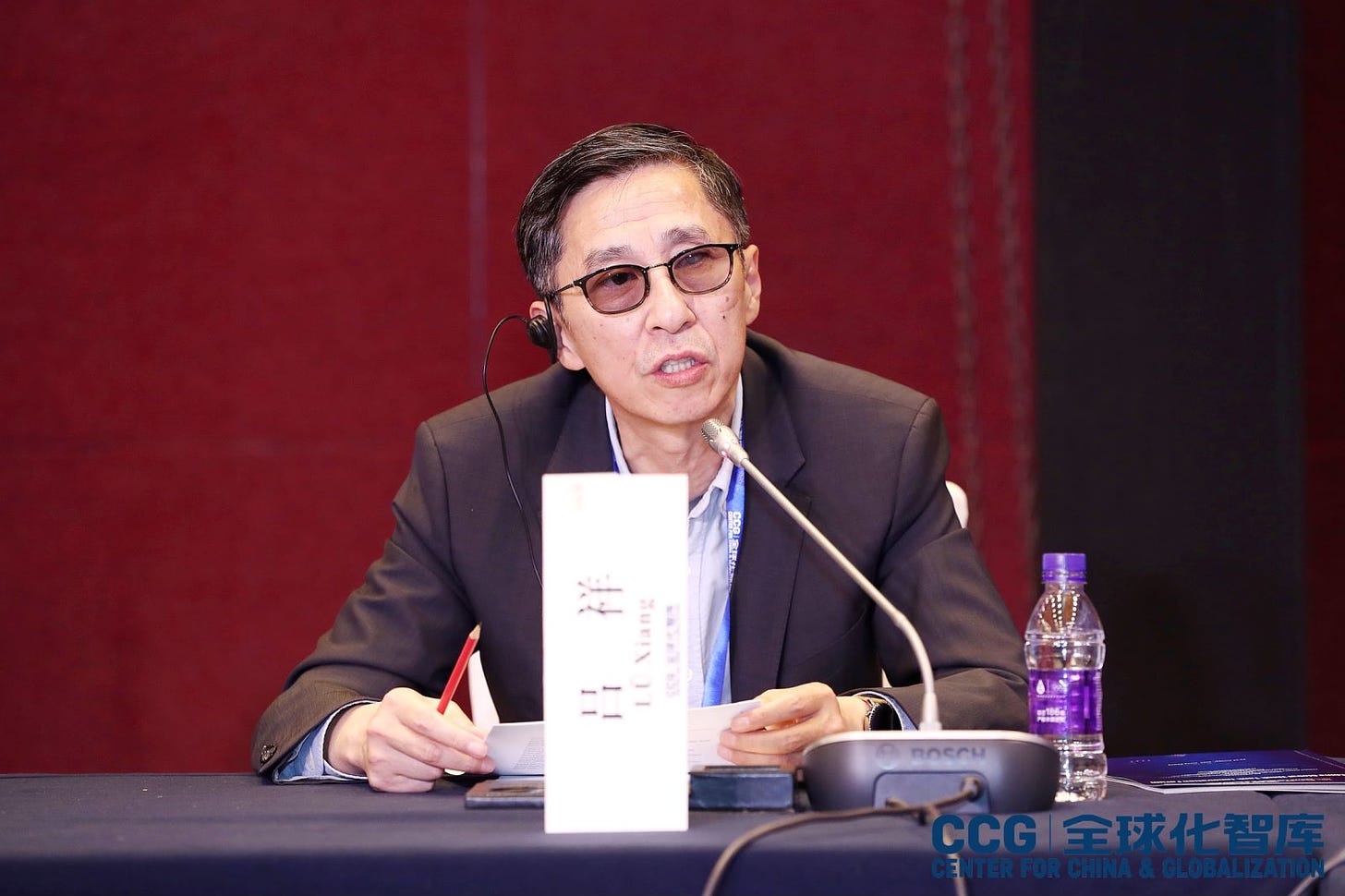
There is news that we may have missed today. The governor of California has arrived in Hong Kong and will soon visit Shenzhen, Guangzhou, Shanghai, Suzhou, and Beijing.
If we look at the editorial by Global Times yesterday and if we look at the statement by the Californian government, we may get the impression that the US and China are very friendly countries in the world. So, we need to consider that there are very good moments of cooperation on regional levels in both countries. We see that California has two valleys: the Sacramento Valley and the San Joaquin Valley.
The San Joaquin Valley produces half of the fruits and nuts in the US, and the demand for this trade is significant. If we consider these positive factors more in the bilateral relations, I believe the future between the two countries, although I don’t want to use the word “bright,” will at least not be as pessimistic as it feels now.
I’m more than delighted to see my old friend Mr. Pillsbury. He made every effort to come to Beijing. We had an in-depth conversation, and I believe our discussions reached the leadership and decision-making levels of both sides.
It played a crucial role in the subsequent signing of the phase one trade agreement between China and the US. But after the signing of the agreement, shortly afterward, COVID-19 broke out and became a global pandemic.
We saw US politics become chaotic, and we still haven’t seen a correction in this chaotic trend in politics in the US. This visit by the governor of California, I think, is more representative of the future of our relations. Under Trump’s administration, when things were tough, we were able to reach an agreement. So, in today’s environment, I think it’s all the more possible that we can reach a better agreement. Thank you.
LI Chen, Associate Professor, School of International Studies, Renmin University of China
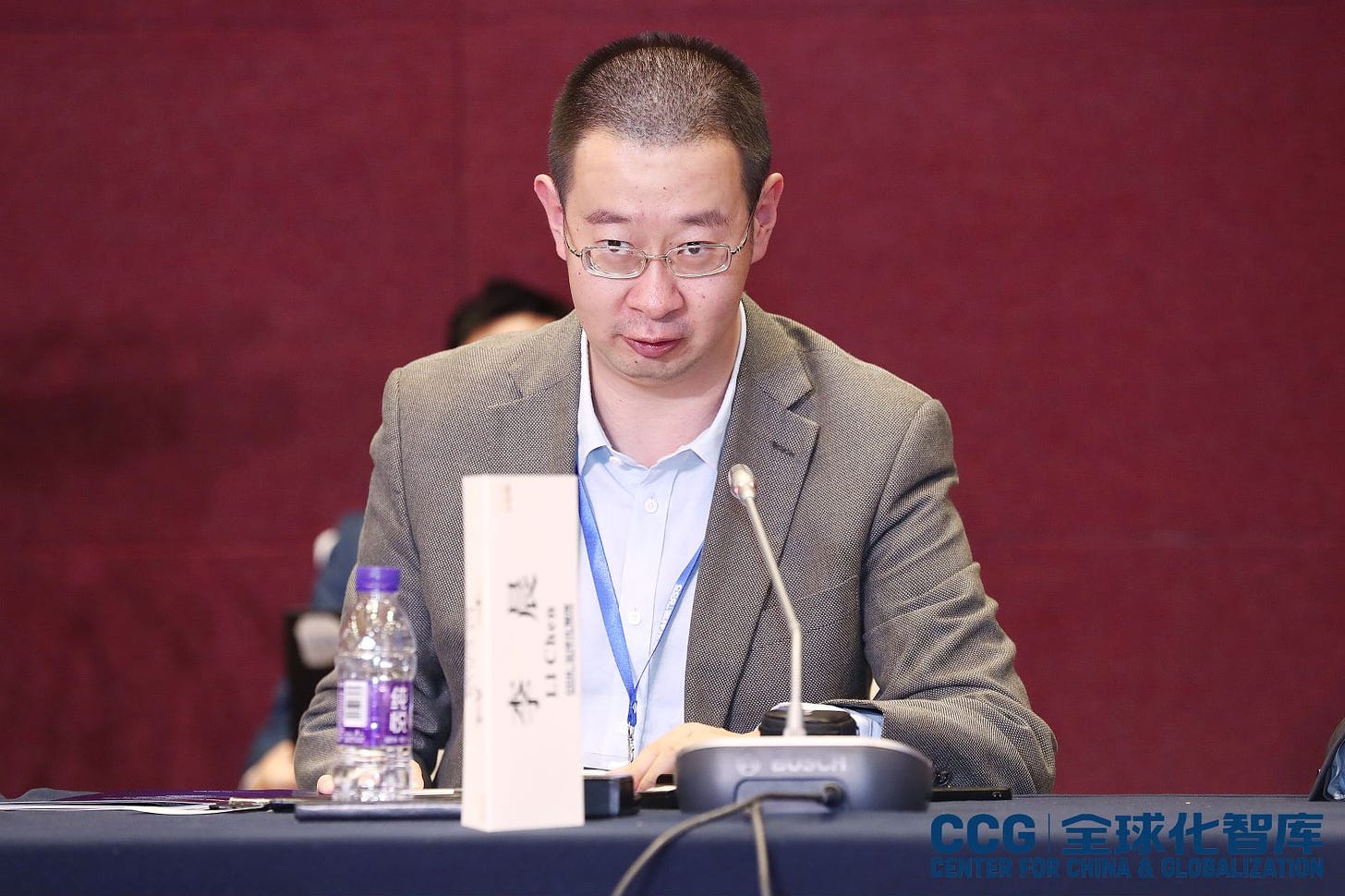
I also want to make three points. First, I believe stability is not something optional for the international community; it’s the foundation of international society. Because I recall Secretary Blinken arguing a few weeks ago that geopolitical instability is a feature of the current international order.
I think the US strategy, the competition strategy, includes toleration, even taking advantage of unstable situations. For example, in the recent Biden administration’s policy towards the Middle East conflict, the US even takes advantage of the Middle East conflict to promote more budgets. Not only for the Middle East and the European situation but also for programs all course.
We need to realize that if we want to promote stability, we should constrain allies, and we should promote more cooperation among the great powers. So, I believe the major responsibility of all the great powers includes reducing and constraining instability and promoting stability. We have to facilitate a transition from instability to stability.
The second thing I want to mention is the revival of multilateralism in crisis management and conflict management because right now we are facing major crises in the Middle East, in Europe, and in the Asia Pacific as well. I don’t think that any single great power or any single bloc can dominate in the management of these crises and conflicts. So, we need a division of labor, and we need some trust among great powers to do crisis management and conflict management.
The third point I want to mention is the so-called AI arms control. Some people recently wrote articles arguing that we need to learn lessons from nuclear arms control during the Cold War for the arms control of AI today. There are some differences between AI and nuclear weapons. While nuclear weapons are primarily just that, AI is a technology that can be applied to both civilian life and the military. I think the US approach to AI, in relation to China, is a little confusing. Because if we want to suppress the AI infrastructure and AI research and development in China, it’s quite challenging to have any serious negotiations with China on the so-called military risk of AI.
So, I believe we need a two-track approach to AI arms control. Track one: cooperation and exchanges on the application of AI for the welfare of all people. And secondly, serious discussions about the uncertainties and risks of AI to both civilian life and military applications. Thank you.
*
Note to readers: Please click the share button above. Follow us on Instagram and Twitter and subscribe to our Telegram Channel. Feel free to repost and share widely Global Research articles.
Featured image is from Andrew Korybko

